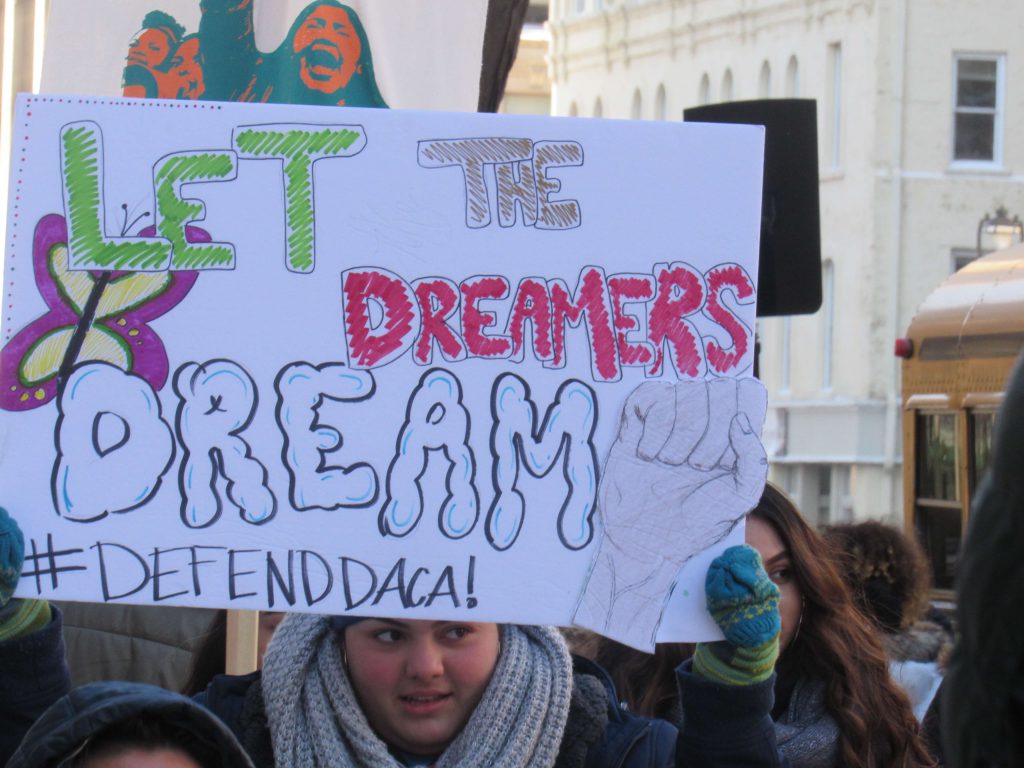Biden Policies Will Help State’s Immigrants
Order halting deportations and bill providing path to citizenship for 11 million welcomed by many.

Teen marcher at Milwaukee Federal Building calling for DACA protections, alongside Voces de la Frontera. Photo by Isiah Holmes/Wisconsin Examiner.
In his first days at the Resolute Desk, President Joe Biden delivered a swift repudiation of former President Donald Trump’s harsh immigration policies, introducing legislation that would create a path to citizenship for 11 million people and allow “Dreamers” — applicants in the Deferred Action for Childhood Arrival (DACA) — to apply for permanent residency.
To provide immediate relief to families living in legal limbo, he also signed a memorandum to the Department of Homeland Security meant to halt deportations for 100 days while the department reviews enforcement policies.
Reaction to Biden’s action on deportations was equally rapid. On Tuesday, a federal judge in Texas blocked the deportation moratorium for at least 14 days, after Texas’ attorney general Ken Paxton sued the administration, calling the deportation stay “a seditious left-wing insurrection,” and arguing that undocumented immigrants are a financial burden on his state.
Marc Christopher, an immigration attorney in Milwaukee, says he has several clients who hope to benefit from Biden’s actions and now have more time to pull together legal cases that could keep their families from being torn apart.
One client, a Milwaukee grandfather, is caring for a son with Down’s Syndrome and a wife who requires frequent hospitalizations from Lupus. He has lived and worked under a deportation order he received in the late 1990s. Christopher has argued that the man’s deportation should be deferred or stopped because of the duties he has caring for his family. Those efforts were denied in court, as a result of the Trump administration’s policies. “He was asked to come back to Immigrations and Customs Enforcement (ICE) at the beginning of February and show documentation that he had planned to get travel documents and an airline ticket,” Christopher tells Wisconsin Examiner.
In the wake of Biden’s new orders, Christopher spoke to ICE and pushed the next supervision date to May. “My hope is by then they will be able to have further guidelines to help out somebody in his situation, so he’s not actually deported.”
Christopher says the Texas lawsuit is an “unfortunate” setback because the 100-day moratorium is meant to provide the Department of Homeland Security a chance to review removal cases to make sure they are in line with changing enforcement priorities.
Despite the Texas decision, Christopher believes the changes in enforcement will have a significant impact on the number of deportations. “The zero tolerance [policy] is no longer in place, and those who have little or no criminal record, and family in the United States, may potentially still be eligible for deferral from removal,” he says.
Living in fear
“I had many clients who have deportation orders. They’ve lived here for years — sometimes 20 years — with a deportation order,” says Christopher, adding that their initial offense is often a minor nonviolent charge, such as a driving violation. “To think about it practically, does it make sense to deport someone who has been in the U.S. without a criminal record, works and supports his family, and may be simply waiting for a visa to become available? Or does it make sense to spend our limited resources on deporting the most egregious offenders, those who pose an actual threat to our nation’s security?”
These two clients, who Christopher declined to name, represent thousands of other working Wisconsinites who have lived in fear that they could be detained by ICE for driving, seeking health care or going to their jobs. “In his situation, he can breathe a little bit freer now, knowing that they’re [ICE agents] are not going to be coming out, coming out for at least the next hundred days. And then, hopefully, something’s going to change.”
Immigrants “breathing easier”
Christine Neumann-Ortiz, executive director of Voces de la Frontera, a statewide advocacy group, says it is no accident that Biden’s policies are more favorable toward immigrants. She believes the Biden/Harris ticket benefited from a strong electoral push from the Latino community.
“I would say for myself and other Latino and immigrant families that were deeply involved in the effort to not just drive out Trump, but to help elect President Biden and Vice President Kamala Harris, that was done on the basis of their commitment to champion immigration, both around pandemic relief and immediate protections,” says Neumann-Ortiz. “They had an impressive platform on immigration that reflected the demands of the movement over the last 20 years.”
Harris, Neumann-Ortiz says, has “deep knowledge around immigration rights.” And, she adds, Biden has a solid track record on immigration and labor rights. “I think it’s a good combination, and I feel hopeful knowing that he was willing to act on all of these issues: immigration rights, LGBTQ rights, the repeal of the Muslim ban. It meant that he was listening.”
She echoes Christopher’s belief that the most important immediate change for undocumented Wisconsinites is the reversal of Trump’s 2017 executive order that allowed ICE to arrest people merely for not having documentation. “It redefined enforcement priorities to say that anyone who was undocumented, which is a civil infraction, was a target for deportation, a priority for deportation,” Neumann-Ortiz says.
The effect of Trump’s policies on immigrant communities has been devastating, she adds. She says many immigrant families include people of mixed status, meaning some family members possess documentation, while others don’t. And often some people lack driver’s licenses.
“Many families live in fear,” she says. “They go to work. They drive, but just do the bare minimum because they need to support their families. These people should be able to get into the car and go to the park and play with their kids. They should be able to participate in school activities. They should be able to take their family members to the hospital without his shadow over them, of being arrested and deported and separated from their families.”
She says focusing enforcement on people who have committed serious crimes, as Biden’s moratorium does, is a significant reversal. “That, right there, is a major quality of life improvement,” she says. “That’s a significant achievement in a demand of the immigrant rights movement. I think the combination of both of those things means there is greater peace for immigrant families here in Wisconsin.”
Wisconsin’s essential workers
Neumann-Ortiz estimates that approximately 90,000 undocumented workers reside in Wisconsin, and that many of them have borne the brunt of the pandemic, filling positions in health care, agriculture, food service and food processing facilities.
Christopher, who also has an office in the Fox River Valley, says the demand for immigration attorneys is high because of the many families and businesses seeking a chance to legalize workers’ status. “The dairy farms overwhelmingly hire foreign workers,” he says. “And you can’t go into any restaurant in Wisconsin where there’s not somebody from Mexico or Central America working there. Dairy farmers call me up all the time, saying ‘I will do whatever I need to do. I will pay whatever amount of your fees to get this person legal.’ And I say, ‘there’s nothing we can do.’”
Neumann-Ortiz believes one of Biden’s priorities should be undertaking immediate action to legalize the status of essential workers. “Immigrant workers have been feeding us, they have been exposed at higher rates to COVID,” she says. “They have died from it because of the failure to provide protections.”
Hope for Dreamers
Neumann-Ortiz also sees reason to celebrate Biden’s desire to allow the upwards of 600,000 young Dreamers (DACA recipients) to apply for permanent residency. “The far-right strategy has been to strip them of their protected status and deport them, and to drag it out through the courts,” says Neumann-Ortiz.
She also wants renewed attention to another Obama-era program, Deferred Action for Parents of Americans and Lawful Permanent Residents (DAPA), which was designed to protect parents whose children had legal documentation. She says many Wisconsin families with mixed immigration status would benefit from reinstating this program, which Trump killed in 2017. “We have over 23,000 Latino youth eligible to become U.S. citizens, and like half of them are children of undocumented parents,” says Neumann-Ortiz.
Passage of Biden’s broader immigration reform bill would require Democrats in the Senate to win over 10 of their Republican colleagues, a longshot given the history of partisan divide. But immigrant rights groups, including a coalition behind the We Are Home campaign, led by the United Farm Workers (UFW), will continue to push for meaningful change.
The eight-year path to citizenship Biden is proposing, says Neumann-Ortiz, is too long, especially for people who have lived and worked here for decades. “There are so many members of Voces that have been here 16 or 20 years, raising their families here, paying their taxes. And we know the dangers of a temporary protected status,” she says. “They can be yanked away.”
Cesar Chavez in the Oval Office
In addition to significant policy shifts, Biden has also enacted several symbolic changes that encourage activists. The federal government will no longer utilize the term “alien” to refer to people without documentation, addressing a decades-long push to humanize the people behind the term.
“I’ve read about the history of the word and it was a Republican strategy to dehumanize immigrants,” says Neumann-Ortiz. “The language we use does have consequences. And I just thought that was a real decent thing to do because dehumanizing others makes it easier to try to pass laws that are harmful as opposed to laws that are compassionate and recognizing humanity and others.”
Biden has also removed the portrait of President Andrew Jackson, who was responsible for the deaths of thousands of Native Americans, and replaced it with Benjamin Franklin. A bust of farmworker organizer Cesar Chavez sits behind Biden’s desk.
“He knows his history, and he knows what side of history he’s on,” says Neumann-Ortiz.
Reprinted with permission of Wisconsin Examiner.





















